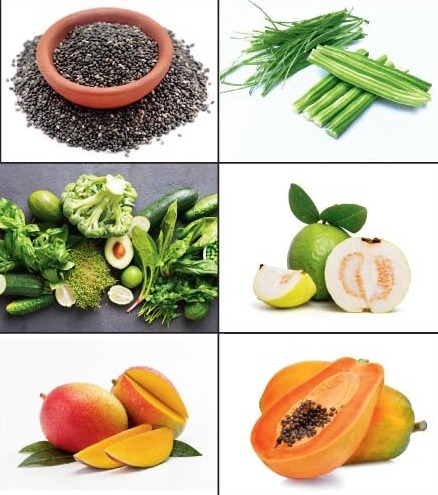What you choose to eat has a profound effect on your overall health. Thus, many people argue that food is our best medicine.
Latest research in the field of nutrigenomics shows that if we eat healthy foods we can turn on health-promoting genes and also turn off disease-promoting genes. The reverse happens if we eat unhealthy foods. Although healthy foods — real and natural plant foods — have tons of health-protecting nutrients including all the vitamins, minerals and phytonutrients, there is one particular substance that is catching the attention of all researchers now. And that is fibre.
Why it matters
Dietary fibre, also known as roughage, is only found in plant foods. Fibre is an essential part of a healthy diet. It not only promotes proper digestion and elimination, but also feeds the beneficial bacteria in your gut. In fact, we have billions of bacteria in our gut and the food of these gut bacteria is fibre. So the more diverse the fibre we eat, the healthier our gut becomes.
Lack of fibre can cause serious issues like constipation, poor gut health, diabetes, heart diseases, obesity, high blood pressure, cancer and many more. In fact, one of the many reasons behind lifestyle diseases becoming an epidemic is the low intake of fibre among today’s young generation.
A story by National Geographic magazine had identified a few places in the world where people have the lowest rates of chronic diseases and live longer than anywhere else. It called these places ‘blue zones’. One common trait among the people of all the blue zones was that they had diets of which 95 per cent was plant-based. Yes and thereby eating enough fibre apart from tons of vitamins, minerals and phyto-nutrients that they get from the food that they eat.
How much of it?
The recommended daily fibre intake to promote good health for women is 21-25g and for men 30-38g. But surprisingly, most Indians consume only half of that recommended amount. So, how do we ensure we are taking the right amount of fibre?
When anyone is sensibly eating a variety of unprocessed and natural plant foods, they tend to get enough fibre. Still, we are sharing with you a list of a few foods that are high in fibre, easy to consume and have tons of health benefits. Here goes the list:
- Ripe Papaya: It has a lot of digestive enzymes and, hence, is good for the gut and digestion.
- Guava: A fruit which has much more vitamin C than oranges and is also loaded with fibre.
- Mango: It’s excellent for digestive health, is high in fibre and great to reverse macular degeneration.
- Drumsticks: A superfood when it comes to immunity and bone health that is also very high in insoluble fibre.
- Chia seeds: This special seed, apart from high fibre content, is also loaded with omega 3 fatty acid and other vital vitamins and trace minerals.
- Green vegetables: The reason why green vegetables are excellent for gut health is that they contain a high amount of fibre.
- Sprouted moong: This is an excellent source of plant protein as well as plant fibre.
Try to ensure that you consume at least three to four items from the list above.
It is only our habits that can create good health and reverse disease. Hence, we recommend that people should add seasonal fruits and salads to their diets for at least twice in a day so that they can develop a habit of eating sufficient fibre on a day-to-day basis.
So, if we need to stay disease free, live healthy and long then we must inculcate the habit of eating sufficient fibre every day.
Karan Kakkad is a nutrigenomics and disease reversal expert. His passion in medical nutrition led to the birth of Reverse Factor, which is backed by an extensive research in nutrigenomics — the scientific study of the interaction of nutrition and genes. Visit www.reversefactor.in for more information. He tweets @karan_kakkad










